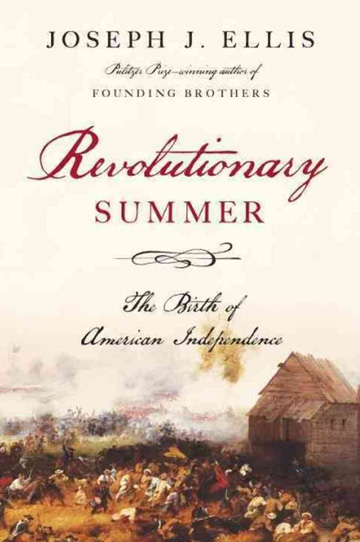
Retreat to Victory
June 13, 2013 | The Barnes & Noble Review
The United States did not need to win the Revolutionary War: the United States merely needed to avoid losing the Revolutionary War. So argues historian Joseph J. Ellis in this brisk and astute history of the intertwined political and military developments of the summer of 1776. That summer, of course, saw the fledgling nation declare independence from Great Britain and hold the constitutional debates that would lead to the Articles of Confederation. But Ellis argues in Revolutionary Summer that the season was also a military turning point: the Continental Army lost the Battle of Long Island, the first full-scale action of the American Revolution, but landed right side up after a key tactical retreat illuminated the means to win the broader war. Because the summer’s political and military events “crest[ed] simultaneously,” they influenced each other for better and worse at the United States’ most vulnerable point in the fight for independence.
After the skirmishes at Lexington and Concord and the bloody but inconclusive Battle of Bunker Hill, the British determined to crush the rebellion with a full invasion. As Ellis writes, “[T]he honeymoon phase of the American Revolution was coming to an end. The victorious insurgency was about to become a full-scale war.” The first wave of British troops arrived off Long Island on June 28th — the same day that a committee sent the draft Declaration of Independence to the full Continental Congress. With a fleet of ships and a fearful roar of cannon, Britain easily gained naval access to the waterways of the New York archipelago, from which it planned to sail up the Hudson River and isolate New England from the other states.
America’s weak defenses at Long Island were arguably the product of the Founders’ highfalutin revolutionary ideals. Many delegates to the Constitutional Convention conflated a standing army with overweening central governments and imperialist oppression. The states therefore sparsely funded the Continental Army, instead relying on what Ellis calls “the myth of the militia”: the notion that citizen-soldiers fighting for a noble cause could handle the greatest military machine on earth. Ellis is not exactly a contrarian, but he does like to puncture illusions about the founding at every opportunity. He writes: “[T]he amateur status of the Continental Army [was] exposed in no uncertain terms on Long Island, and all the platitudinous incantations about the moral superiority of the American cause had fallen victim to the military superiority of a professional army.” Being in the right was no longer enough: you also had to be able to shoot straight and flank the enemy.
The decision to abandon Long Island rather than mount a counter-offensive was particularly hard on the aristocrat George Washington, to whom the idea of a tactical retreat was a dishonorable act, like reneging on a wager. But the Americans came to realize that they could never outgun the British head to head: they had to use geography, terrain, and a zealous population to their advantage. The evacuation itself is Revolutionary Summer’s thrilling centerpiece, told in Ellis’s trademark blend of narrative and analysis. Ten thousand American soldiers crossed the East River from Brooklyn Heights under cover of darkness, forbidden to talk or even to cough, lest they alert a British warship. Aided by a heavy fog and disguised under the subterfuge of fortifying the Long Island troops, the Americans executed what Ellis calls “one of the most brilliant tactical withdrawals in the annals of military history.” Washington’s pride demanded that he himself take the last ferry across.
Throughout the book, Ellis conveys an easy command of the Revolutionary era and its personalities — an authority best displayed in his Pulitzer Prize–winning Founding Brothers (2000). John Adams, the leader of the radicals in the Continental Congress and an indefatigable debater, was a “one-man volcano” who on occasion was so passionate as to appear “slightly out of control.” His opposite number, Thomas Jefferson, was more reticent: “by disposition self-contained, some combination of aloof and shy, customarily standing silently in groups, with his arms folded tightly against his chest as if to ward off intruders.” Washington himself was a man “so comfortable with his superiority” that, through silence and sheer physicality, he made “himself a vessel into which admirers poured their fondest convictions.”
Ellis concludes that the Battle of Long Island proved “the end of the beginning” for the Americans, and “the beginning of the end” for Britain. Even as consensus eluded the Continental Congress on elemental matters like proportional representation, federalism, and of course slavery, the states remained united in their opposition to imperialism. The Americans had denied Britain the clean victory that would have ended the war before it began, just after declaring themselves a new nation. Six years of fighting lay ahead. But the United States was one long summer closer to independence.